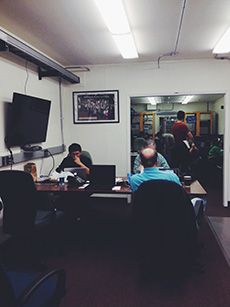Experimenters relish MTest control room updates, new one coming soon
 |
Researchers at the Fermilab Test Beam Facility have a more comfortable place to work while their experiments run now that the MTest control room has been renovated. FTBF will begin building a new MCenter control room soon. Photo: Sarah Witman, DO |
The Fermilab Test Beam Facility, on the brink of building a new MCenter control room, is fresh off another update: renovating its MTest control room.
The FTBF, housed on the west side of the Meson Detector Building, uses two versatile beamlines — MTest and MCenter — to provide beam for a variety of experiments. Users of the facility bring in their detectors for short periods, usually days or weeks at a time, to see how they behave in conjunction with the facility's many beam types.
"Everybody that comes in has different needs," explained Eugene "JJ" Schmidt, deputy manager of the facility. "We need to basically pull out one experiment and bring in another in 24-hour periods."
Taking advantage of the recent year-plus accelerator shutdown, FTBF staff made some much-needed improvements to the MTest control room.
First, they installed pieces of equipment called patch panels for network, signal and high-voltage cables in both the control room and the enclosures that house the experiments' detectors. This means experimenters no longer need to run long bundles of cables between these areas — a distance of about 50 feet at the far end. Schmidt said this helps saves time, which is precious on their tight schedules. It also mitigates safety risks, since experimenters no longer have to climb up high to install cables.
The renovated MTest control room also boasts new network cameras for researchers to keep tabs on their experiments and a fully upgraded network infrastructure. Perhaps most valuable to experimenters, if mainly cosmetic, were the changes to the control room's interior.
"We stripped down the entire control room," Schmidt said. "We got it patched, painted, re-carpeted and got some surplus desks from CDF."
Currently, the room is active with experimenters milling about or sitting at the new desks, heads together. Schmidt said some of the most well received features by users have been a new videoconference table with a big-screen monitor and a fish tank housing some new mascots. Some updates seem to have improved workflow as well.
"Now, based on who is in here, we can move furniture around to create workstations. It is much more flexible than it was before," Schmidt said.
Now that the MTest renovation is winding down, they can start to focus on building a whole new control room for MCenter, the other FTBF beamline. The goal is to complete that project in November so that it's ready to go when beam starts running early next year.
They hope this will make room for more experiments, particularly ones that will be installed for longer periods of time. The first experiment to run will be LArIAT, which studies particle tracks in liquid argon.
In 2012, the Fermilab Test Beam Facility served 11 experiments with 229 collaborators from 64 institutions in 14 countries.
"We are trying to develop this into a very user-friendly facility serving a lot of experiments," Schmidt said.
—Sarah Witman
|